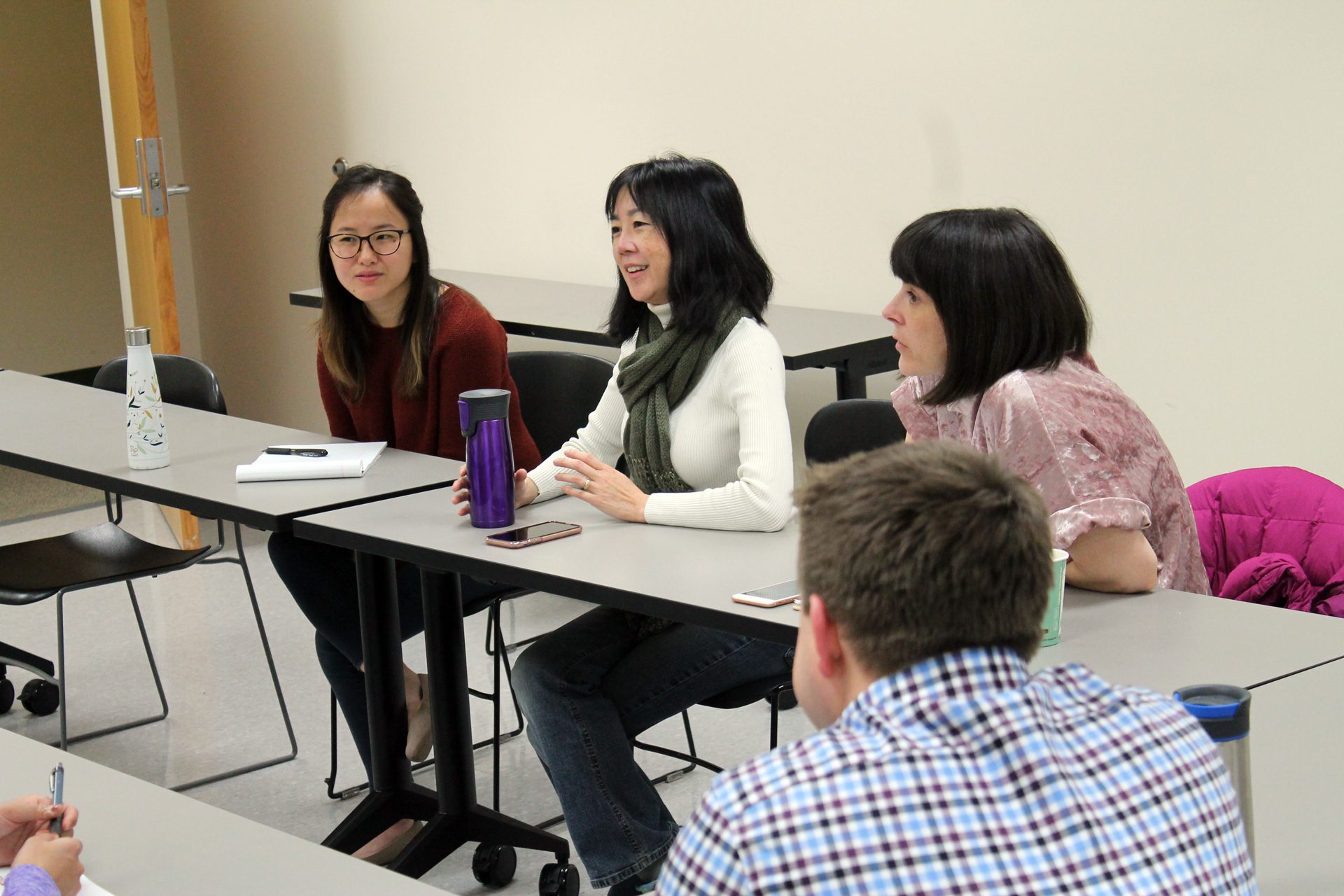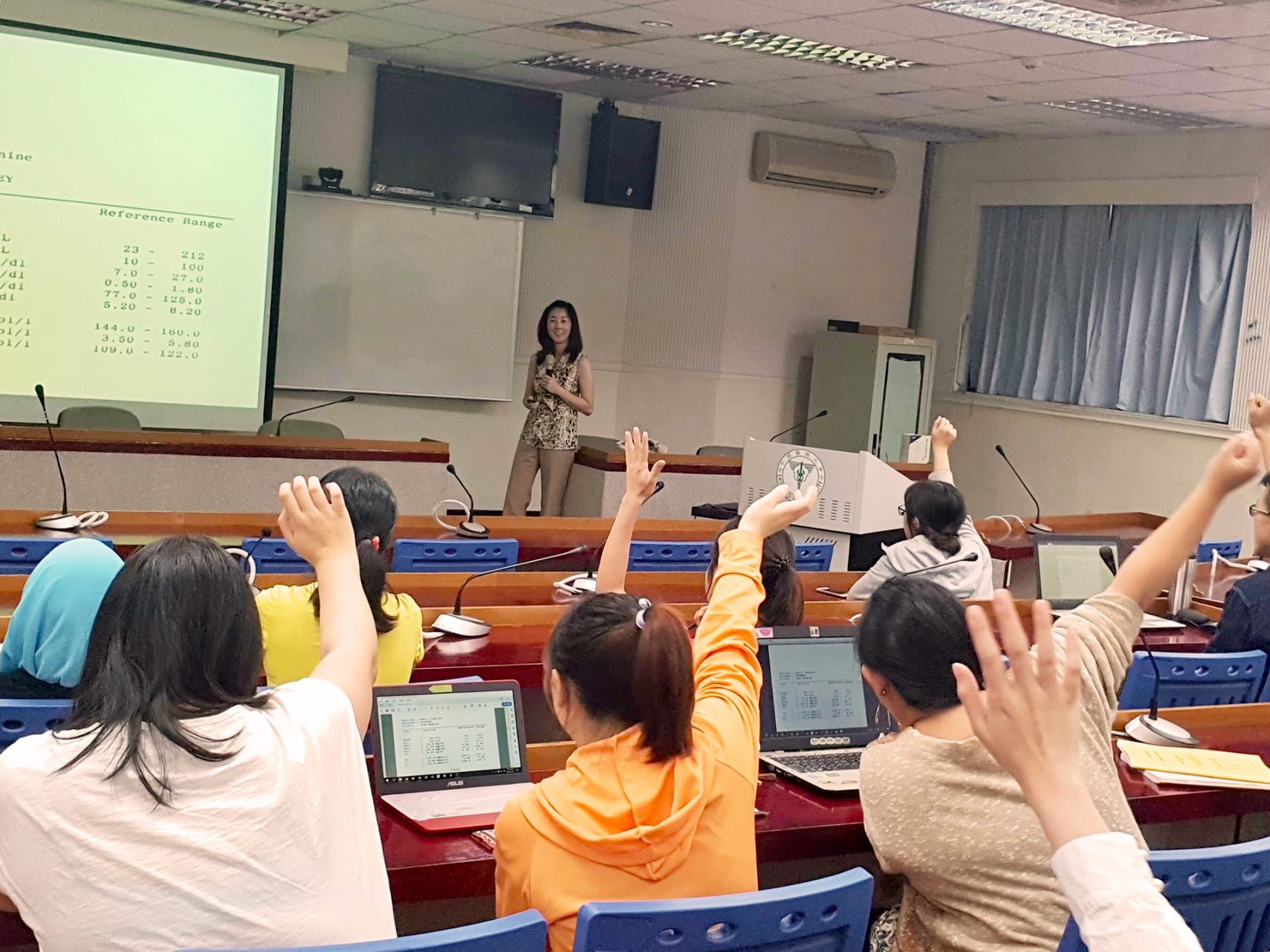“My philosophy of teaching and education is one that focuses on the student.”
Throughout my teaching experience, it has always been important to me to put the students first and develop a relationship with them. By genuinely caring about and listening to my students, we are able to openly communicate and understand each other. This approach allows me to gauge how their comprehension develops and, with student feedback, streamline the exchange of information. I rely on our communication to continuously improve the quality of my teaching.

Since arriving at UW–Madison, I have taught professional and graduate courses in the Doctor of Pharmacy program. One of my goals for these pharmacy students is to empower them to be advocates for change. The pharmacy profession is changing every day, and with change comes uncertainty. Although it is easier to think in the same proverbial “box” as every other pharmacist, it will take innovators and leaders to make the field of pharmacy better for pharmacists and their patients.
Each semester, a multi-disciplinary group of graduate students elect to workshop writing their federal grant together. We meet weekly and utilize a small group peer-review process to elicit meaningful feedback. I assist the students by sharing my own experiences with grant writing and provide individual feedback on their grants. By the end of the semester, my students show growth in both their grant writing skills and confidence in their research.
This course is designed to help graduate students with an interest in human health further their research and understanding of the grant application process. Through targeted reviews of NIH and AHRQ applications, we discuss how to find grant opportunities, what is expected in a grant application, and work through the application process together. My co-instructor and I sit in on group discussions to guide students through any challenges they may have.
Grant writing is important because grants are the primary source of funding for graduate student research and beyond. By taking the time to build fundamental writing skills and using a peer-review process, students will be prepared to formulate and defend their research. This course fosters collaboration, with equal parts scientific mentoring and practical career development advice. It’s been taken for course credit by PhD students from nearly a dozen departments and is continuing to expand every semester.
“Safety and Quality in the Medication Use” (course 729-608) is a required course for the 3rd year pharmacy curriculum. My focus is on teaching students to think beyond the current roles and responsibilities of pharmacists; instead, I encourage them to envision a time when pharmacists will be considered the patient safety leaders in their health systems.

Unlike many pharmacy classes, I de-emphasize the need to memorize information. I recognize that when students graduate, they will need to apply knowledge and develop coherent answers to the questions that they are asked, rather than recognize the correct answer with multiple-choice questions. Students complete projects that showcase their innovative thinking. In this course, students partner with a practicing pharmacy to assess current patient safety strategies. They are asked to identify a need, then implement and evaluate a patient safety intervention. Although it is difficult logistically to manage the number of field projects in this course, the project provides a much richer experience for students, instead of contriving cases that are as complex and detailed as in the real world.
“This course provided an opportunity to learn from experienced and successful grant writers, and a lens for how to tailor your writing to your audience. I applied what I learned and used my course materials to submit and receive funding for a Pilot Study training grant! Now, I am now in the process of applying for an R36 dissertation award. This course was super beneficial for my graduate school program and future career!” – Taylor W.
“I’ve heard that grant writing is one of those “on-the-job” skills. This is one of the few classes that prepare you in advance to form an imperative skill for both academic and industry careers. Through this course, I gained techniques that help me with the content, structure, and precision of my grant writing.” – Shweta S.
“I feel very fortunate that I teach students in the same area that I conduct research. This allows me to introduce my own research, as well as current and credible literature, that add depth and application to the content that I teach.”
At times, students have not understood why learning about safety research in other subjects, such as aviation or surgery, could be relevant to practicing pharmacy. I am happy to say that a number of students have reached out to me after their completion of the course, describing how prevalent the subject of patient safety was in their practices, and how impressed their employers were when they confidently jumped into projects to improve patient safety. I have been approached by four students who were interested in conducting safety-related research projects with me for independent study credit. Six students have asked me to serve as their advisor for a graduate certificate in patient safety, managed through the Department of Industrial & Systems Engineering at UW–Madison. I have received the School of Pharmacy Teaching Innovation Award to develop the multi-disciplinary approach used in teaching the course.
My teaching philosophy embodies a spirit of continuous quality improvement: a drive to always think critically about what and how I teach, and to think about ways to improve. When I was invited to contribute to the Safety and Quality in the Medication Use System course, it included 13 lecturers who came from diverse backgrounds and had different expectations for the students. This led to significant information repetition, which made it difficult for students to recognize and integrate important content. The course also included a longitudinal case in which students applied concepts, which could not include all of the details and nuances necessary to fully capture the multi-dimensional nature of medication safety.
Since 2009, my co-coordinator and I have sought to improve the course through a number of changes:
With these changes, students can seamlessly apply learned concepts to their positions post-graduation. I am always open to making changes to improve the student learning process. Moving forward, we are investigating the feasibility of converting our lecture format to a small discussion format, as well as blending face-to-face interaction with virtual formats.
Mentoring